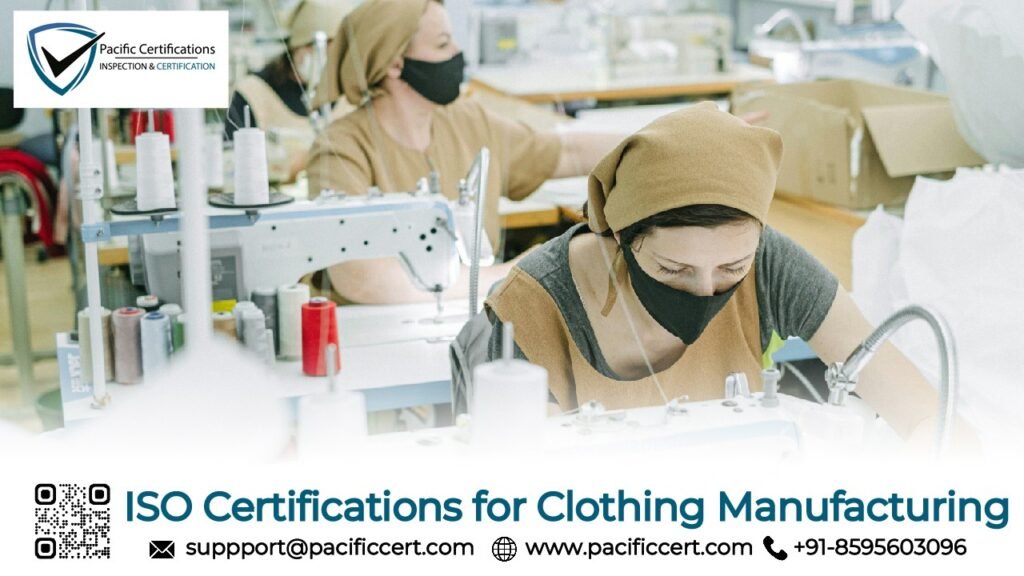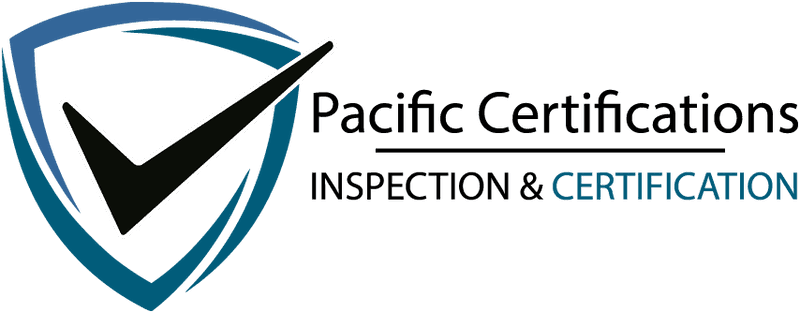
ISO Certifications for Clothing Manufacturing Businesses, Requirements and Benefits
In the fast-paced world of clothing manufacturing and maintaining quality is paramount. ISO certifications serve as globally recognized benchmarks for achieving excellence in these areas. By adhering to these standards, manufacturers can enhance their reputation and meet customer expectations.
ISO standards are globally recognized frameworks designed to ensure that products and services meet specified quality, safety, and efficiency criteria. In clothing manufacturing, these standards play a crucial role in improving production processes, reducing waste, and promoting sustainability.

With an industry heavily influenced by consumer trends, fast fashion demands, and environmental concerns, clothing manufacturers must adopt strategies that balance profitability with responsibility. ISO certifications provide the necessary guidelines to achieve these goals while maintaining high levels of product quality and operational excellence.
If you’re aiming for ISO certification for clothing manufacturing, we’re here to guide you. Contact us at support@pacificcert.com or call +91-8595603096 to start your certification journey.
Applicable ISO Standards for Clothing Manufacturing
Clothing manufacturing involves complex processes, including sourcing raw materials, design, production, and distribution. Various ISO standards apply to ensure efficiency and sustainability at each stage.
ISO 9001: Quality Management Systems (QMS): ISO 9001 is the most widely adopted quality management standard. It focuses on meeting customer expectations, enhancing satisfaction, and continually improving processes. For clothing manufacturers, this means maintaining high product quality and addressing defects promptly.
ISO 14001: Environmental Management Systems (EMS): Sustainability is a growing concern in the fashion industry. ISO 14001 helps clothing manufacturers manage their environmental responsibilities, including reducing waste, minimizing carbon emissions, and improving resource efficiency.
ISO 45001: Occupational Health and Safety Management: Ensuring worker safety is essential in clothing manufacturing. ISO 45001 addresses risks related to occupational health and safety, helping businesses create safer working environments.
ISO 26000: Social Responsibility: Ethical manufacturing practices are vital in today’s clothing industry. ISO 26000 provides guidance on implementing socially responsible processes, addressing labor conditions, and minimizing exploitation in the supply chain.
ISO 50001: Energy Management Systems: Energy consumption is a significant cost and environmental factor for clothing manufacturers. ISO 50001 provides strategies to enhance energy efficiency and reduce consumption.
ISO 20400: Sustainable Procurement: This standard focuses on sustainable sourcing, ensuring that raw materials are procured ethically and responsibly, supporting eco-friendly practices throughout the supply chain.
ISO 10002: Customer Satisfaction and Complaint Management: Ensuring customer satisfaction is key to retaining loyalty. ISO 10002 helps manufacturers establish effective complaint handling mechanisms, enhancing trust and reputation.
Click here to find out more applicable standards to your industry
At Pacific Certifications, we specialize in helping clothing manufacturers achieve ISO certifications. From initial audits to issuing certifications, our expertise ensures a seamless process. As a globally recognized certification body, we are dedicated to fostering compliance and excellence across the clothing industry.
By partnering with us, businesses can demonstrate their commitment to quality, sustainability, and safety, enhancing their market competitiveness.
Take your business to the next level with ISO certification. Get in touch via support@pacificcert.com or call +91-8595603096 for expert support.
Requirements of ISO Certifications for Clothing Manufacturing

ISO 9001: Quality Management Systems (QMS)
- Quality Objectives: Establish measurable quality goals aligned with customer and business needs.
- Process Control: Define and document processes to ensure uniformity and efficiency.
- Customer Focus: Understand customer requirements and maintain mechanisms for feedback and satisfaction measurement.
- Performance Evaluation: Regularly monitor and evaluate the effectiveness of quality management systems through audits and reviews.
- Continuous Improvement: Use performance data and customer feedback to identify areas for enhancement.
ISO 14001: Environmental Management Systems (EMS)
- Environmental Policy: Develop a policy that outlines the organization’s commitment to sustainability and environmental protection.
- Identification of Environmental Aspects: Identify and evaluate the environmental impact of manufacturing processes, from material sourcing to waste disposal.
- Compliance Obligations: Ensure adherence to relevant environmental laws and regulations.
- Life Cycle Perspective: Consider the entire lifecycle of a product, including design, production, distribution, and disposal.
- Emergency Preparedness: Implement plans to address potential environmental emergencies, such as chemical spills or excessive emissions.
ISO 45001: Occupational Health and Safety Management
- Hazard Identification: Identify workplace hazards, including machinery risks, ergonomic issues, and chemical exposure.
- Risk Assessment: Assess and prioritize risks, implementing controls to minimize them.
- Worker Participation: Engage employees in identifying risks and developing safety measures.
- Incident Response: Develop procedures for responding to and reporting workplace incidents effectively.
- Legal Compliance: Stay updated on health and safety regulations applicable to the clothing industry.
ISO 26000: Social Responsibility
- Human Rights: Respect workers’ rights, including fair wages, safe working conditions, and freedom of association.
- Fair Operating Practices: Avoid unethical practices such as corruption and exploitation.
- Community Involvement: Engage with local communities and contribute positively to their development.
ISO 50001: Energy Management Systems
- Energy Policy: Develop a clear policy outlining the organization’s energy management goals.
- Energy Baseline: Establish a baseline for current energy use to measure improvements over time.
- Energy Performance Indicators (EnPIs): Define metrics to track and analyze energy efficiency.
- Operational Control: Optimize energy-intensive processes, such as textile dyeing and machinery operation.
- Continual Improvement: Identify opportunities for energy-saving technologies and strategies.
ISO 20400: Sustainable Procurement
- Supplier Evaluation: Assess suppliers based on their sustainability practices, such as ethical labor and environmentally friendly methods.
- Risk Assessment in Procurement: Identify risks in the supply chain, such as child labor or illegal sourcing of raw materials.
- Life Cycle Thinking: Consider the environmental and social impact of materials throughout their lifecycle.
- Stakeholder Engagement: Collaborate with stakeholders to promote sustainable procurement practices.
ISO 10002: Customer Satisfaction and Complaint Management
- Complaint Policy: Define a clear policy for managing customer complaints.
- Feedback Channels: Provide accessible channels for customers to share feedback or grievances.
- Root Cause Analysis: Investigate the root cause of complaints to prevent recurrence.
- Resolution Timelines: Set realistic and transparent timelines for addressing complaints.
- Monitoring and Reporting: Track complaint trends to improve products and services.
Need ISO certification for clothing manufacturing? Contact us at support@pacificcert.com or phone +91-8595603096 for reliable and efficient service.
Benefits of ISO Certifications for Clothing Manufacturing

Improved Product Quality: ISO 9001 ensures consistent quality, reducing defects and increasing customer satisfaction. This leads to repeat business and stronger brand loyalty.
Enhanced Sustainability: By adopting ISO 14001 and ISO 50001, manufacturers can minimize their environmental footprint. This is critical in addressing global sustainability challenges and appealing to eco-conscious consumers.
Worker Safety and Well-Being: ISO 45001 helps manufacturers prioritize employee health and safety, reducing workplace incidents and fostering a positive work culture.
Market Competitiveness: ISO certifications are internationally recognized, making businesses more competitive in global markets. Buyers and partners often prefer certified suppliers for their reliability and credibility.
Cost Savings: Efficient energy use, waste reduction, and streamlined processes save money in the long run. Standards like ISO 50001 and ISO 14001 help identify cost-effective practices.
Consumer Trust: Transparent processes and high standards build consumer trust. ISO certifications are a testament to a company’s commitment to quality, ethics, and sustainability.
As of 2024, the clothing manufacturing industry continues to evolve, influenced by technology, sustainability, and consumer behavior. Key trends include:
- Smart Manufacturing: Integration of IoT and AI in production lines for real-time monitoring and efficiency.
- Circular Fashion: Growing adoption of recycling and reusing materials to reduce waste.
- Transparency: Increased consumer demand for traceability in sourcing and production.
- Green Initiatives: Businesses prioritizing certifications like ISO 14001 to meet environmental goals.
Companies that embrace these trends and align with ISO standards are better positioned to thrive in an increasingly competitive landscape.
Pacific Certifications is accredited by ABIS, in case you need support with ISO certification for your Clothing Manufacturing business, please contact us at support@pacificcert.com or +91-8595603096.
FAQs: ISO Certifications for Clothing Manufacturing
ISO certifications ensure quality, safety, and sustainability, helping manufacturers meet customer expectations and comply with international standards.
Key standards include ISO 9001 (Quality Management), ISO 14001 (Environmental Management), ISO 45001 (Health and Safety), and ISO 50001 (Energy Management).
The timeline varies depending on the organization’s readiness and the standard pursued. Typically, it ranges from a few weeks to several months.
Yes, ISO certifications enhance credibility, operational efficiency, and market access for businesses of all sizes.
While not mandatory, ISO 14001 is increasingly important for businesses aiming to demonstrate environmental responsibility and appeal to eco-conscious consumers.
Pacific Certifications offers comprehensive audit services and issues certifications, ensuring a seamless process tailored to your business needs.
Read More at: Blogs by Pacific Certifications






